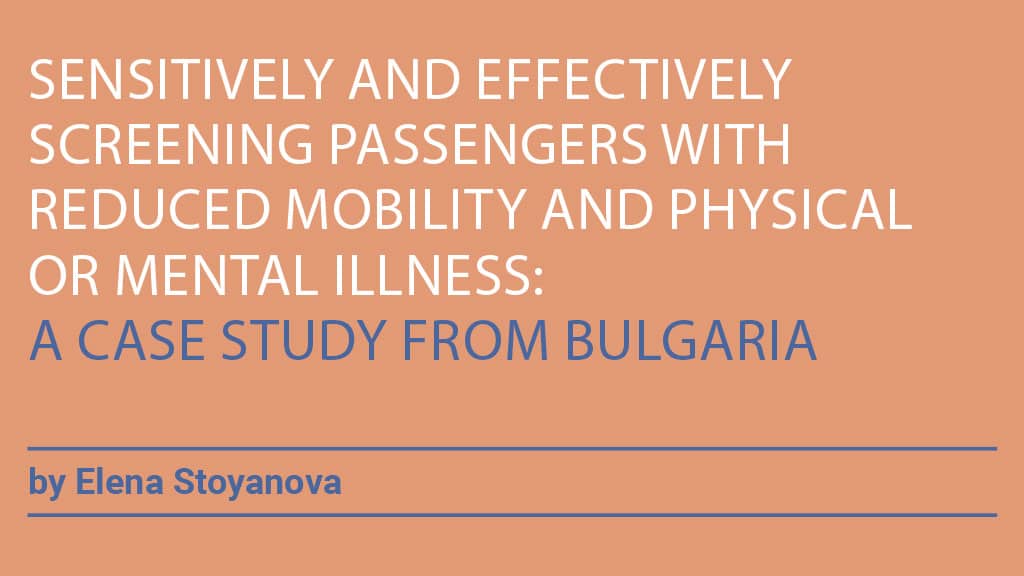Screening passengers with reduced mobility and physical or mental illness is a huge challenge for aviation security personnel. Passengers should be checked in a way that reasonably ensures that they are not carrying prohibited articles. On the other hand, the screening should be sensitive to the mental and physical capabilities of each passenger.
Regardless of the crisis experienced by the air transport industry since March 2020 and the significant resultant drop in global passenger traffic, in the long run the number of passengers with reduced mobility being screened at airports will grow. Bear in mind that there are currently around 650 million people with disabilities worldwide.
Statistical data regarding passengers with reduced mobility (PRMs) who passed through Sofia Airport in the last 10 years (2009–2019) show a significant increase in this passenger category.

Screening PRMs poses certain unique challenges for security staff. In 2015, a routine check of a PRM at Sofia Airport revealed a 40cm sword concealed inside the passenger’s walking stick.

Tasers and pepper sprays are being discovered in the cabin baggage of elderly passengers with increasing frequency, highlighting the importance of providing aviation security personnel with effective training in the appropriate screening of PRMs.
Sofia Airport Aviation Training Centre has been licensed to conduct training of civil aviation personnel since 2007, and aviation security personnel training began there in 2011. Instructors have received train-the-trainer courses on PRM screening and disability awareness conducted by experienced international companies, allowing them to deliver thorough and consistent in-house training on this subject. PRM training provided by Sofia Airport Aviation Training Centre is included in the programme approved by the Bulgarian CAA (entitled Training of persons implementing screening of persons, cabin baggage, items carried). Recurrent training is every 18 months and has proven very useful as it allows an opportunity for the exchange of personnel’s practical experiences.
PRM training includes familiarisation with legal requirements in force and best practice guidance. Disability awareness training is essential. It helps staff to understand the diversity of disabilities and to develop appropriate, sensitive and effective responses to PRMs. The methods of screening persons with reduced mobility, their baggage, medical aids, wheelchairs or guide dogs, and those in plaster, splints and with artificial limbs are very important parts of the training programme. Hand search is the primary method for checking that passengers are not carrying prohibited articles; however, in the case of some PRMs, this approach may be inappropriate or inefficient. Moreover, it is impossible to screen a wheelchair user’s entire body by hand. Therefore, this method should be replaced with others such as millimetre wave scanning, explosive trace detection equipment, and explosive detection dogs. We must also acknowledge the fact that not all disabilities are visible; security employees must communicate extensively with PRMs in order to determine the best way to screen them.

The use of behavioural analysis can play an important role in security, and particularly in detecting passengers feigning a disability in order to hide prohibited articles. In Bulgaria, security staff are trained in basic behaviours relating to different PRM issues. If deviation from the norm is detected, extended screening (including an interview) must be conducted. During the training programme, special attention is paid to the fact that PRM screening must be conducted in a private room in order to ensure discretion and effectiveness. If the PRM refuses to be screened privately, the screening should be completed at the sеcurity checkpoint – swiftly but thoroughly. In Bulgaria, medical documentation is not a mandatory requirement of PRMs. For PRMs that claim to have had surgery – such as metal implants – screening must be conducted in a private room and, again, the use of behavioural analysis is important.

An additional challenge for security employees is the increasing number of passengers with developmental conditions such as Down syndrome and autism; psychological disorders such as depression, schizophrenia, and bipolar disorder; and, neuro-degenerative disorders such as dementia (including Alzheimer’s). Often, passengers do not inform the PRM department of their conditions in advance as they fear they might be rejected from their flight. This creates a certain risk as the screening procedure should be kept to a minimum; it’s not good for PRMs with mental health problems to wait in lengthy lines, becoming increasingly nervous. The cabin crew must be informed of such passengers on board. In the training programme we emphasise that, whilst screening should obviously be done effectively, security screeners must remain polite, kind, calm and professional. In the event that the passenger becomes distressed during screening, assistance may be required from the supervisor; however, if the situation becomes impossible to handle, assistance should be sought from an authorised medical person, and border police and the aviation operator should be notified.
Practical elements of the PRM training include role-playing and exercises. Trainees roleplay situations involving PRMs in order to develop an appropriate mindset and to understand the subject. The classroom training concludes with a written test but further ‘on-the-job’ training is conducted to ensure that the employee is capable of performing independently at the screening checkpoint.
All instructors from Sofia Airport Aviation Training Centre are fully committed to providing high-quality training in order to ensure that the best screening practices are put in place and that passengers with reduced mobility are screened with dignity and respect.

Elena Stoyanova Ph.D. is a senior aviation security expert at Sofia Airport Aviation Training Centre.
